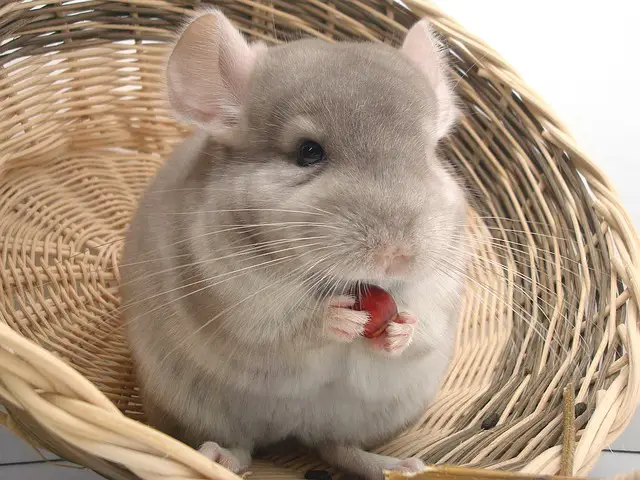Chinchillas are adorable creatures, but they can also be very messy. If you have a chinchilla as a pet, you know that they love to chew on things and that they often make a mess. One of the main things you need to worry about when it comes to your chinchilla’s safety is what fabrics they come in contact with. In this blog post, we will discuss the best fabrics for chinchillas and what to avoid.
Which fabrics are safe for chinchillas and why
Chinchillas are delicate creatures, and their smooth fur can easily be damaged by rough fabrics.
When choosing bedding or clothing for your chinchilla, it’s important to select materials that are soft and smooth.
The best fabrics for chinchillas are those that are loosely woven and provide plenty of ventilation.
Cotton is a good choice, as it is soft and absorbent. however, avoid using fabrics that have been treated with chemicals, as these can be harmful to your chinchilla’s delicate skin.
In general, it’s best to err on the side of caution when selecting fabrics for your chinchilla and to avoid any materials that could potentially cause irritation or discomfort.
The importance of fabric choice when furnishing a chinchilla’s home
When choosing fabric for a chinchilla’s home, it’s important to consider both the needs of the chinchilla and the overall aesthetic of the space.
Chinchillas are creatures of habit, and they like to nest in soft, cozy areas. Therefore, fabrics that are soft to the touch and durable enough to withstand daily use are ideal.
In addition, chinchillas are notoriously messy eaters, so it’s important to select a fabric that can be easily cleaned.
Finally, chinchillas are sensitive to temperature fluctuations, so a fabric that breathes well is essential.
With all of these factors in mind, wool and cotton are two of the best materials for furnishing a chinchilla’s home.
How to test for fabric safety with your chinchilla
If you’re concerned about the safety of fabric before using it with your chinchilla, there are a few things you can do to test it.
- First, try to rub the fabric against your own skin – if it’s scratchy or irritates your skin, it’s likely not going to be comfortable for your chinchilla either.
- Next, hold the fabric up to your mouth and breathe in – if you smell any chemicals, it’s best to avoid using that fabric with your chinchilla.
- Finally, try to see if the fabric is absorbent – if it isn’t, it won’t be able to wick away moisture from your chinchilla’s fur, which could lead to health problems.
By following these simple steps, you can help ensure that any fabric you use with your chinchilla is safe and comfortable.
Are fleece liners safe for chinchillas?
Fleece liners are a popular choice for chinchilla owners, as they are soft and absorbent. However, there are some potential risks to using fleece liners.
If they are not cleaned regularly, they can harbor bacteria and fungal growth. In addition, fleece liners can cause chinchillas to overheat, as they do not allow the skin to breathe.
As a result, fleece liners should only be used with careful supervision.
If you choose to use them, be sure to clean them frequently and provide your chinchilla with plenty of ventilation.
Will chinchillas eat fleece
Chinchillas are intelligent and curious creatures, and they have been known to nibble on all sorts of things, including fleece.
However, fleece is not a natural part of their diet, and it can cause digestive problems if it’s ingested in large quantities.
For this reason, it’s best to keep chinchillas away from fleece blankets, clothes, and toys. If you do find that your chinchilla has eaten some fleece, watch for signs of GI distress, such as diarrhea or vomiting. If you see any of these signs, contact your veterinarian right away.
Are towels safe for chinchillas?
When it comes to keeping your chinchilla clean, you have a few different options. One popular method is to use a towel.
However, there are a few things you need to keep in mind if you decide to go this route.
- First of all, make sure the towel you use is soft and non-abrasive. Chinchillas have sensitive skin, so a rough towel could cause irritation.
- Secondly, avoid using scented towels or those that have been treated with fabric softeners. These can be harmful if ingested, and they can also irritate your chinchilla’s respiratory system.
- Finally, make sure the towel is completely dry before you put it back in the cage. Wet towels can promote the growth of bacteria and fungi, which can cause health problems for your chinchilla.
If you follow these guidelines, towels can be a safe and effective way to keep your chinchilla clean and comfortable.
Tips for keeping your chinchilla healthy and safe in their new home
Now that you’ve welcomed a new chinchilla into your home, it’s important to take steps to ensure that they stay healthy and safe. Here are a few tips to get you started:
- First, be sure to provide your chinchilla with a spacious cage that is well-ventilated and escape-proof. They should also have plenty of toys and hiding places to keep them entertained.
- Second, it’s important to feed your chinchilla a balanced diet of hay, pellets, vegetables, and water. Avoid giving them sugary treats or foods high in fat and protein.
- Third, make sure to clean their cage regularly to prevent the build-up of bacteria and toxins.
- Finally, provide your chinchilla with regular veterinary care to ensure that they remain healthy and happy.
By following these simple tips, you can help your chinchilla adjust to their new home and enjoy a long and healthy life.




